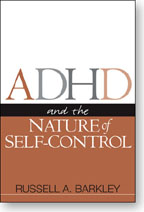 by Russell A. Barkley, Ph.D.
by Russell A. Barkley, Ph.D.
Russell A. Barkley provides a radical shift of perspective on ADHD, arguing that the disorder is fundamentally a developmental problem of self-control, and that a deficit in attention is a secondary, and not universal, characteristic.
Full Description:
This far-reaching work from renowned scientist-practitioner Russell A. Barkley provides a radical shift of perspective on ADHD, arguing that the disorder is fundamentally a developmental problem of self-control, and that a deficit in attention is a secondary, and not universal, characteristic. The volume synthesizes neuropsychological research and theory on the executive functions, illuminating how normally functioning individuals are able to bring behavior under the control of time and orient their actions toward the future. Meticulously applying this model to an examination of the cognitive and social impairments manifested by ADHD, Barkley offers compelling new directions for thinking about and treating this disorder.
The book reviews the diagnostic criteria of ADHD, identifying the inadequacies of current conceptualizations, and presents a range of new and testable hypotheses about the nature of the disorder. Shifting the focus of ADHD theory building away from inattention per se, Barkley delves into the vital construct of behavioral inhibition. Chapters draw upon extensive neuropsychological research to show how the ability to delay one's response to external stimuli permits the development of the executive functions involved in self-control. Providing a new level of insight into the day-to-day adaptive functioning problems of affected children and adults, the book demonstrates how ADHD disrupts the developmental process by which behavior becomes internalized, resulting in an inability to regulate and direct behavior toward the future. "This is a masterful synthesis of what we know about ADHD from the clinic and the laboratory. Dr. Barkley's focus on the failure of hyperactive children and adults to inhibit their behavior has major and useful implications for diagnosis and treatment. This book will make a lasting contribution."
-Judith Rapoport, MD
422 Pages Size: 6" x 9" softcover
1. The Nature of Attention-Deficit/Hyperactivity Disorder
A Brief History of ADHD. Core Symptoms of ADHD. Situational and Contextual Factors. Associated Cognitive Impairments. Diagnostic Criteria for ADHD. ADHD-Predominantly Inattentive Type. Conclusion.
2. Biological Etiologies Associated with ADHD
Neurological Factors. Genetic Factors. Environmental Toxins. Implications for Theory Construction. Conclusion.
3. Defining Behavioral Inhibition, Self-Control, and Executive Function
Definition of Terms. Events That Initiate Inhibition and Self-Control. Conclusion.
4. Behavioral Inhibition and ADHD
Evidence for Deficits in Behavioral Inhibition in ADHD. Why Is a New Theory of ADHD Needed? Conclusion.
5. Neuropsychological Views of the Executive Functions: The Origins of a Hybrid Model
Origins of a Hybrid Model. The Nature of Executive Functions. The Executive Functions: A Synthesis. Conclusion.
6. Additional Evidence Supporting the Existence of the Executive Functions
Studies Using Factor Analysis with Test Batteries of Executive Functions. Neuroimaging Studies Using Measures of Executive Functions. Relationship of Intelligence to Executive Functions. Conclusion.
7. Constructing the Hybrid Model of Executive Functions
Behavioral Inhibition. Nonverbal Working Memory: Covert Sensing to the Self. Internalization of Speech (Verbal Working Memory). Self-Regulation of Affect/Motivation/Arousal. Reconstitution. Motor Control/Fluency/Syntax. Comparisons to Other Models. The Place of "Sustained Attention" in the Model. On the Nature of the "Central Executive." Human Will and Volition. Conclusion.
8. Developmental Considerations: Self-Control as an Instinct
Development of the Executive Function. Self-Control as Instinct. Conclusion.
9. Extending the Hybrid Model of Executive Functions to ADHD
Predictions of the Hybrid Model. The Nature of Inattention in ADHD. Conclusion.
10. Evidence Supporting Executive Function Deficits in ADHD
Important Methodological Caveats. Evidence for Working Memory Deficits in ADHD. Evidence for Deficits in Self-Regulation of Affect/Motivation/Arousal. Evidence for Deficits in Reconstitution. Evidence for Deficits in Motor Control/Fluency/Syntax. ADHD and Intelligence (IQ). Stimulant Medication Effects on ADHD and Executive Functions. ADHD, Reproductive Fitness, and Life Expectancy. Unresolved Issues. Conclusion.
11. Understanding ADHD and Self-Control: Social and Clinical Implications
Social Implications of Understanding ADHD. Implications for Clinical Diagnosis. Implications for Clinical Assessment. Implications for Treatment. Conclusion.
Stock- ships in 5-9 business days!
|